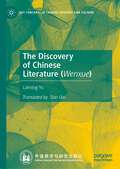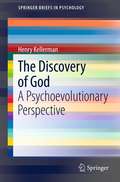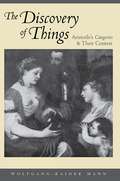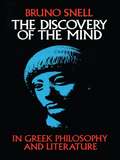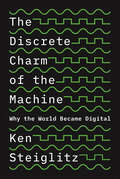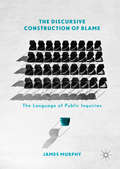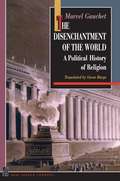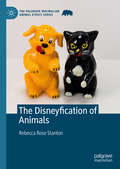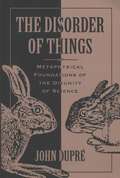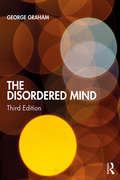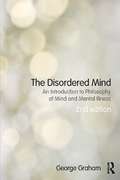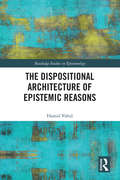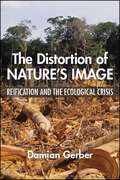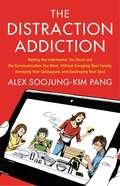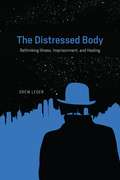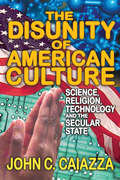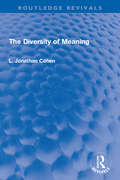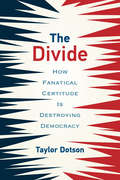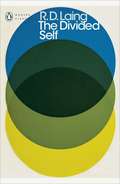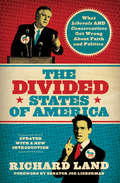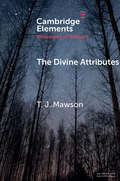- Table View
- List View
The Discovery of Chinese Literature (Key Concepts in Chinese Thought and Culture)
by Laiming YuThis book traces the origin and evolvement of two Chinese characters “wenxue”(literature) by using the methods of conceptual history and historical and cultural semantics, and by taking the evolution and changes of the concept of the these two characters and their interpretations in the west as a window, and re-examining the contemporary morphology of concept evolution in the historical context of concept generation and development to discover the historical and cultural connotations hidden behind the characters, so as to embark on a vivid journey to explore the history of literary thought, discipline and culture. The entire book is woven with the concept of “literature” at its core. Following the author's analysis and interpretation, an interlocking and orderly network of description of ancient and modern, Chinese and foreign unfolds. In this context, the chapters are progressive and mutually responsive, forming an organic whole which is connected at the beginning and the end. For those readers who are trying to understand how Chinese “wenxue” evolved from one of the “four disciplines of Confucius” into a modern discipline and concept, this book will provide the most detailed, in-depth, and vivid historical picture.
The Discovery of Freedom: Man's Struggle Against Authority
by Rose Wilder Lane(from Introduction) This is a revolutionary work. It picks up and develops the individualistic aspects of the American political thought of Thomas Paine, Thomas Jefferson, James Madison, James Wilson, George Mason and others, which so strangely dropped into neglect in the aftermath of the French Revolution in the 1790s. Disregarding a few intellectuals who failed to excite the imaginations of their fellows, let alone any significant number of Americans, nothing of the originality and power of the American revolutionaries has appeared until the publication of this book. The Discovery of Freedom was first published during the Second World War. Rose Wilder Lane told me that the publishers made no effort to promote the book. Its total sales were tiny even for that period, and doubly so for a book written by a nationally known literary figure whose career had encompassed investigative journalism, the publication of hundreds of short stories and articles, and a number of recent novels that had placed high on the best seller lists. Nonetheless, the book did circulate, often dog-eared copies passed from hand to hand and did influence many people. Along with Ayn Rand's different approach to the basis of freedom, it was the seminal force creating the current wide trend toward individualistic views in America. Henry Grady Weaver produced an adaptation and popularization of the book, which appeared under the title The Mainspring of Human Progress, which subsequently sold hundreds of thousands of copies.
The Discovery of God
by Henry KellermanThe debate between theist and atheist is an old one and has recently become a highly publicized one. There are some well known proponents of arguments on both sides. To provide a different perspective this book takes a psychoanalytically based evolutionary view, presenting an entirely original theoretical concept. It introduces an epigenetic component to the discussion of God/no God within the context of evolutionary processes at the point where a thinking brain appears -- a cerebral cortex characteristic of homosapien. Therefore, it joins evolutionary phenomena with psychological realities for survival and safety, for empowerment and the absence of disempowerment. Research is cited to show that such instinctive survival behavior involves several prototypical behavioral categories relevant to all organisms from amoeba to man. Freud, Darwin, Gould, and the major historical figures of the God/no God debate are included throughout, and the point is made that environmental conditions can produce biological effects and this is the essence of the proposed epigenetical context of the debate. Therefore, this volume concerns itself with exploring the question of whether there is a God-gene or whether God is discovered epigentically in a psycho/evolutionary context. In either case, this book does not argue for the existence or non-existence of God. Rather, it introduces a new dimension to the debate -- a psycho/evolutionary one.
The Discovery of Things: Aristotle's Categories and Their Context
by Wolfgang-Rainer MannAristotle's Categories can easily seem to be a statement of a naïve, pre-philosophical ontology, centered around ordinary items. Wolfgang-Rainer Mann argues that the treatise, in fact, presents a revolutionary metaphysical picture, one Aristotle arrives at by (implicitly) criticizing Plato and Plato's strange counterparts, the "Late-Learners" of the Sophist. As Mann shows, the Categories reflects Aristotle's discovery that ordinary items are things (objects with properties). Put most starkly, Mann contends that there were no things before Aristotle. The author's argument consists of two main elements. First, a careful investigation of Plato which aims to make sense of the odd-sounding suggestion that things do not show up as things in his ontology. Secondly, an exposition of the theoretical apparatus Aristotle introduces in the Categories--an exposition which shows how Plato's and the Late-Learners' metaphysical pictures cannot help but seem inadequate in light of that apparatus. In doing so, Mann reveals that Aristotle's conception of things--now so engrained in Western thought as to seem a natural expression of common sense--was really a hard-won philosophical achievement. Clear, subtle, and rigorously argued, The Discovery of Things will reshape our understanding of some of Aristotle's--and Plato's--most basic ideas.
The Discovery of the Mind: in Greek Philosophy and Literature
by Bruno SnellEuropean thinking began with the Greeks. Science, literature, ethics, philosophy -- all had their roots in the extraordinary civilization that graced the shores of the Mediterranean a few millennia ago. The rise of thinking among the Greeks was nothing less than a revolution; they did not simply map out new areas for thought and discussion, they literally created the idea of man as an intellectual being -- an unprecedented concept that decisively influenced the subsequent evolution of European thought.In this immensely erudite book, German classicist Bruno Snell traces the establishment of a rational view of the nature of man as evidenced in the literature of the Greeks -- in the creations of epic and lyric poetry, and in the drama. Here are the crucial stages in the intellectual evolution of the Greek world: the Homeric world view, the rise of the individual in the early Greek lyric, myth and reality in Greek tragedy, Greek ethics, the origin of scientific thought, and Arcadia.Drawing extensively on the works of Homer, Pindar, Archilochus, Aristophanes, Sappho, Heraclitus, the Greek tragedians, Parmenides, Callimachus, and a host of other writers and thinkers, Snell shows how the Homeric myths provided a blueprint for the intellectual structure the Greeks erected; how the notion of universality in Greek tragedy broadened into philosophical generalization; how the gradual unfolding of the concepts of intellect and soul provided the foundation for philosophy, science, ethics, and finally, religion.Unquestionably one of the monuments of the Geistegeschichte (History of Ideas) tradition, The Discovery of the Mind throws fresh light on many long-standing problems and has had a wide influence on scholars of the Greek intellectual tradition. Closely reasoned, replete with illuminating insight, the book epitomizes the best in German classical scholarship -- a brilliant exploration of the archetypes of Western thought; a penetrating explanation of how we came to think the way we do.
The Discrete Charm of the Machine: Why the World Became Digital
by Ken SteiglitzThe genesis of the digital idea and why it transformed civilizationA few short decades ago, we were informed by the smooth signals of analog television and radio; we communicated using our analog telephones; and we even computed with analog computers. Today our world is digital, built with zeros and ones. Why did this revolution occur? The Discrete Charm of the Machine explains, in an engaging and accessible manner, the varied physical and logical reasons behind this radical transformation.The spark of individual genius shines through this story of innovation: the stored program of Jacquard’s loom; Charles Babbage’s logical branching; Alan Turing’s brilliant abstraction of the discrete machine; Harry Nyquist’s foundation for digital signal processing; Claude Shannon’s breakthrough insights into the meaning of information and bandwidth; and Richard Feynman’s prescient proposals for nanotechnology and quantum computing. Ken Steiglitz follows the progression of these ideas in the building of our digital world, from the internet and artificial intelligence to the edge of the unknown. Are questions like the famous traveling salesman problem truly beyond the reach of ordinary digital computers? Can quantum computers transcend these barriers? Does a mysterious magical power reside in the analog mechanisms of the brain? Steiglitz concludes by confronting the moral and aesthetic questions raised by the development of artificial intelligence and autonomous robots.The Discrete Charm of the Machine examines why our information technology, the lifeblood of our civilization, became digital, and challenges us to think about where its future trajectory may lead.
The Discursive Construction of Blame: The Language of Public Inquiries
by James MurphyThis book examines the language of public inquiries to reveal how blame is assigned, avoided, negotiated and discussed in this quasi-legal setting. In doing so, the author adds a much-needed linguistic perspective to the study of blame – previously the reserve of moral philosophers, sociologists and psychologists – at a time when public inquiries are being convened with increasing frequency. While the stated purpose of a public inquiry is rarely to apportion blame, this work reveals how blame is nevertheless woven into the fabric of the activity and how it is constructed by the language of the participants. Its chapters systematically analyse the establishment of inquiries, their questioning patterns, how blame can be avoided by witnesses, how blame is assigned or not by an inquiry’s panel and how such blame may result in public apologies. The author concludes with an engaging discussion on the value of public inquiries in civic life and suggestions for changes to the processes of public inquiries. This book will appeal to readers with a general interest in public and political language; in addition to scholars across the disciplines of communication, media studies, politics, sociology, social policy, philosophy, psychology, linguistics, rhetoric, public relations and public affairs.
The Disenchantment of the World: A Political History of Religion
by Marcel GauchetMarcel Gauchet has launched one of the most ambitious and controversial works of speculative history recently to appear, based on the contention that Christianity is "the religion of the end of religion." In The Disenchantment of the World, Gauchet reinterprets the development of the modern west, with all its political and psychological complexities, in terms of mankind's changing relation to religion. He views Western history as a movement away from religious society, beginning with prophetic Judaism, gaining tremendous momentum in Christianity, and eventually leading to the rise of the political state. Gauchet's view that monotheistic religion itself was a form of social revolution is rich with implications for readers in fields across the humanities and social sciences.Life in religious society, Gauchet reminds us, involves a very different way of being than we know in our secular age: we must imagine prehistoric times where ever-present gods controlled every aspect of daily reality, and where ancestor worship grounded life's meaning in a far-off past. As prophecy-oriented religions shaped the concept of a single omnipotent God, one removed from the world and yet potentially knowable through prayer and reflection, human beings became increasingly free. Gauchet's paradoxical argument is that the development of human political and psychological autonomy must be understood against the backdrop of this double movement in religious consciousness--the growth of divine power and its increasing distance from human activity.In a fitting tribute to this passionate and brilliantly argued book, Charles Taylor offers an equally provocative foreword. Offering interpretations of key concepts proposed by Gauchet, Taylor also explores an important question: Does religion have a place in the future of Western society? The book does not close the door on religion but rather invites us to explore its socially constructive powers, which continue to shape Western politics and conceptions of the state.
The Disneyfication of Animals (The Palgrave Macmillan Animal Ethics Series)
by Rebecca Rose StantonThis book critically examines how Walt Disney Animation Studios has depicted – and sometimes failed to depict – different forms of harming and objectifying non-human animals in their films. Each chapter addresses a different form of animal harm and objectification through the theories of speciesism, romanticism, and the ‘collapse of compassion’ effect, from farming, hunting and fishing, to clothing, work, and entertainment. Stanton lucidly presents the dichotomy between depictions of higher order, anthropomorphised and neotonised animal characters and that of lower-order species, showing furthermore how these depictions are closely linked to changing social attitudes about acceptable forms of animal harm. An engaging and novel contribution to the field of Critical Animal Studies, this book explores the use of animals not only in Disney’s best known animated films such as 101 Dalmatians, but also lesser known features including Home on the Range and Fun and Fancy Free. A quantitative appendix supplying data on how often each animal species appears and the amount of times animal harm or objectification is depicted in over fifty films provides an invaluable resource and addition to scholars working in both Disney and animal studies.
The Disorder of Things: Metaphysical Foundations of the Disunity of Science
by John DupreThe great dream of philosophers and scientists for millennia has been to give us a complete account of the order of things. A powerful articulation of such a dream in this century has been found in the idea of a unity of science. With this manifesto, John Dupré systematically attacks the ideal of scientific unity by showing how its underlying assumptions are at odds with the central conclusions of science itself. In its stead, the author gives us a metaphysics much more in keeping with what science tells us about the world. Elegantly written and compellingly argued, this provocative book will be important reading for all philosophers and scholars of science.
The Disordered Mind
by George GrahamThe Disordered Mind, Third Edition is a wide-ranging introduction to the philosophy of mental disorder or illness. It examines and explains, from a philosophical standpoint, what mental disorder is: its reality, causes, consequences, compassionate treatment, and more. Revised and updated throughout, the third edition includes enhanced discussions of the distinction between mental health and illness, selfhood and delusions about the self, impairments of basic psychological capacities in mental disorder and the distinct roles that mental causation and neural mechanisms play in mental illness. The book is organized around four questions: What is a mental disorder or illness? What makes mental disorder something bad? What are various mental disorders and what do they tell us about the mind? What is mental health and how may it be restored? Numerous disorders are discussed including: addiction, agoraphobia, delusion, depression, dissociative identity disorder, obsession-compulsion, schizophrenia, and religious scrupulosity, among others. Several neurological disorders are examined. Various problems associated with DSM-5 and with psychiatric diagnosis are explored. Including chapter summaries and suggestions for further reading, The Disordered Mind is an ideal text for courses in philosophy and should appeal to not just philosophers, but to readers in cognitive science, psychology, psychiatry and related mental health professions.
The Disordered Mind: An Introduction to Philosophy of Mind and Mental Illness
by George GrahamThe Disordered Mind: An Introduction to Philosophy of Mind and Mental Illness, second edition examines and explains, from a philosophical standpoint, what mental disorder is: its reality, causes, consequences, and more. It is also an outstanding introduction to philosophy of mind from the perspective of mental disorder. Revised and updated throughout, this second edition includes new discussions of grief and psychopathy, the problems of the psychophysical basis of disorder, the nature of selfhood, and clarification of the relation between rationality and mental disorder. Each chapter explores a central question or problem about mental disorder, including: what is mental disorder and can it be distinguished from neurological disorder? what roles should reference to psychological, cultural, and social factors play in the medical/scientific understanding of mental disorder? what makes mental disorders undesirable? Are they diseases? mental disorder and the mind-body problem is mental disorder a breakdown of rationality? What is a rational mind? addiction, responsibility and compulsion ethical dilemmas posed by mental disorder, including questions of dignity and self-respect. Each topic is clearly explained and placed in a clinical and philosophical context. Mental disorders discussed include clinical depression, dissociative identity disorder, anxiety, religious delusions, and paranoia. Several non-mental neurological disorders that possess psychological symptoms are also examined, including Alzheimer's disease, Down's syndrome, and Tourette's syndrome. Containing chapter summaries and suggestions for further reading at the end of each chapter, The Disordered Mind, second edition is a superb introduction to the philosophy of mental disorder for students of philosophy, psychology, psychiatry, and related mental health professions.
The Dispositional Architecture of Epistemic Reasons (Routledge Studies in Epistemology)
by Hamid VahidThis book is concerned with the conditions under which epistemic reasons provide justification for beliefs. The author draws on metaethical theories of reasons and normativity and then applies his theory to various contemporary debates in epistemology. In the first part of the book, the author outlines what he calls the dispositional architecture of epistemic reasons. The author offers and defends a dispositional account of how propositional and doxastic justification are related to one another. He then argues that the dispositional view has the resources to provide an acceptable account of the notion of the basing relation. In the second part of the book, the author examines how his theory of epistemic reasons bears on the issues involving perceptual reasons. He defends dogmatism about perceptual justification against conservatism and shows how his dispositional framework illuminates certain claims of dogmatism and its adherence to justification internalism. Finally, the author applies his dispositional framework to epistemological topics including the structure of defeat, self-knowledge, reasoning, emotions and motivational internalism. The Dispositional Architecture of Epistemic Reasons demonstrates the value of employing metaethical considerations for the justification of beliefs and propositions. It will be of interest to scholars and advanced students working in epistemology and metaethics.
The Dispossessed: Karl Marx's Debates on Wood Theft and the Right of the Poor
by Daniel BensaïdExcavating Marx&’s early writings to rethink the rights of the poor and the idea of the commons in an era of unprecedented privatization The politics of dispossession are everywhere. Troubling developments in intellectual property, genomics, and biotechnology are undermining established concepts of property, while land appropriation and ecological crises reconfigure basic institutions of ownership. In The Dispossessed, Daniel Bensaïd examines Karl Marx&’s early writings to establish a new framework for addressing the rights of the poor, the idea of the commons, and private property as a social institution.In his series of articles from 1842–43 about Rhineland parliamentary debates over the privatization of public lands and criminalization of poverty under the rubric of the &“theft of wood,&” Marx identified broader anxieties about customary law, property rights, and capitalist efforts to privatize the commons. Bensaïd studies these writings to interrogate how dispossession continues to function today as a key modality of power. Brilliantly tacking between past and present, The Dispossessed discloses continuity and rupture in our relationships to property and, through that, to one another.In addition to Bensaïd&’s prescient work of political philosophy, The Dispossessed includes new translations of Marx&’s original &“theft of wood&” articles and an introductory essay by Robert Nichols that lucidly contextualizes the essays.
The Dissenters
by John L. GwaltneyOral histories of people who have engaged in acts of principled dissent collected by eminent, blind, African American anthropologist.
The Distortion of Nature's Image: Reification and the Ecological Crisis (SUNY series in New Political Science)
by Damian GerberThe global ecological crisis is upon us. From global warming to the long-term implications of ocean acidification, air and water pollution, deforestation, and the omnipresent dangers of nuclear technology the future of our planetary home is threatened. Yet in the midst of the unfolding crisis, the conventional ideologies of the twentieth century and their representations of nature remain unchallenged by both the defenders of capitalism and capitalism's most radical critics. The Distortion of Nature's Image illustrates how the anti-naturalism of late capitalist society, in which nature is reified into the emptiness of mere matter, simply a thing to be dominated, is subtly complemented by the failure of the Left to go both beyond the historic limitations of Marx's ninteenth-century viewpoint and beyond anarchism's blind faith in "natural law." However, an alternative for comprehending nature and the ecological crisis as historical and social phenomena remains open in the dialectical naturalism of Western Marxism and Murray Bookchin's social ecology. By examining in closer detail how Bookchin's social ecology politicizes the concept of nature, as well as how precursory models in Western Marxist thought provide a foundation for this, Damian Gerber illustrates how the notion of an ecological society remains a decisively political question.
The Distraction Addiction: Getting the Information You Need and the Communication You Want, Without Enraging Your Family, Annoying Your Colleagues, and Destroying Your Soul
by Alex Soojung-Kim PangThe question of our time: can we reclaim our lives in an age that feels busier and more distracting by the day? We've all found ourselves checking email at the dinner table, holding our breath while waiting for Outlook to load, or sitting hunched in front of a screen for an hour longer than we intended. Mobile devices and the web have invaded our lives, and this is a big idea book that addresses one of the biggest questions of our age: can we stay connected without diminishing our intelligence, attention spans, and ability to really live? Can we have it all? Alex Soojung-Kim Pang, a renowned Stanford technology guru, says yes. THE DISTRACTION ADDICTION is packed with fascinating studies, compelling research, and crucial takeaways. Whether it's breathing while Facebook refreshes, or finding creative ways to take a few hours away from the digital crush, this book is about the ways to tune in without tuning out.
The Distressed Body: Rethinking Illness, Imprisonment, and Healing
by Drew LederBodily pain and distress come in many forms. They can well up from within at times of serious illness, but the body can also be subjected to harsh treatment from outside. The medical system is often cold and depersonalized, and much worse are conditions experienced by prisoners in our age of mass incarceration, and by animals trapped in our factory farms. In this pioneering book, Drew Leder offers bold new ways to rethink how we create and treat distress, clearing the way for more humane social practices. Leder draws on literary examples, clinical and philosophical sources, his medical training, and his own struggle with chronic pain. He levies a challenge to the capitalist and Cartesian models that rule modern medicine. Similarly, he looks at the root paradigms of our penitentiary and factory farm systems and the way these produce distressed bodies, asking how such institutions can be reformed. Writing with coauthors ranging from a prominent cardiologist to long-term inmates, he explores alternative environments that can better humanize—even spiritualize—the way we treat one another, offering a very different vision of medical, criminal justice, and food systems. Ultimately Leder proposes not just new answers to important bioethical questions but new ways of questioning accepted concepts and practices.
The Disunity of American Culture: Science, Religion, Technology and the Secular State
by John C. CaiazzaThe Disunity of American Culture describes culture now, when different forces are influencing it than in the past, altering it to near incomprehensibility. Identity issues have an effect on culture and politics; more influential is the question of what support the state is obligated to provide the individual. John C. Caiazza seeks to explain how this situation came to be.He begins with an explanation of the origins of Protestantism in America. Caiazza describes how the American religion has declined and the recent responses the decline has provoked. Caiazza follows with an analysis of science as it presently exists in American culture. The work of three scientists prominent in their respective fields—Steven Weinberg in physics, E. O. Wilson in biology, and Stanley Milgram in psychology—are examined with respect to how their work has influenced culture.The author examines the failure of America's school of philosophy, pragmatism, to explain the relationship between religion, science, and general culture, even though its founders, Charles S. Peirce and William James, made serious efforts to do so. He concludes by making the case that there is a contradiction between scientific reason and the claim of state power. Caiazza argues that cultural disharmony will guarantee that the secular state never achieves the dominance over culture and political life it desires.
The Diversity of Meaning (Routledge Revivals)
by L. Jonathan CohenFirst published in 1962, The Diversity of Meaning was written to provide a more constructive criticism of the philosophy of ordinary language than the more destructive approach that it was commonly subjected to at the time of publication. The book deals with a range of philosophical problems in a way that cuts underneath the more typical orthodoxies of the time. It is concerned primarily with the concept of meaning and asks not just how people ordinarily speak or think about meanings, but also what is gained or lost by their so doing. The author challenges the assumption that there is only one way of talking about meanings and instead argues that no single analysis of meaning can suit the semantics of lexicographers, language-teachers, translators, logicians, historians of ideas, psychologists and philosophers. By examining various common concepts of meaning and their relations to one another, the book sheds light on the issues most alive in philosophical controversy at the time of publication, giving it lasting relevance for those interested in the history of philosophical thought and theory.
The Divide: How Fanatical Certitude Is Destroying Democracy
by Taylor DotsonWhy our obsession with truth--the idea that some undeniable truth will make politics unnecessary--is driving our political polarization.In The Divide, Taylor Dotson argues provocatively that what drives political polarization is not our disregard for facts in a post-truth era, but rather our obsession with truth. The idea that some undeniable truth will make politics unnecessary, Dotson says, is damaging democracy. We think that appealing to facts, or common sense, or nature, or the market will resolve political disputes. We view our opponents as ignorant, corrupt, or brainwashed. Dotson argues that we don't need to agree with everyone, or force everyone to agree with us; we just need to be civil enough to practice effective politics. Dotson shows that we are misguided to pine for a lost age of respect for expertise. For one thing, such an age never happened. For another, people cannot be made into ultra-rational Vulcans. Dotson offers a road map to guide both citizens and policy makers in rethinking and refashioning political interactions to be more productive. To avoid the trap of divisive and fanatical certitude, we must stop idealizing expert knowledge and romanticizing common sense. He outlines strategies for making political disputes more productive: admitting uncertainty, sharing experiences, and tolerating and negotiating disagreement. He suggests reforms to political practices and processes, adjustments to media systems, and dramatic changes to schooling, childhood, the workplace, and other institutions. Productive and intelligent politics is not a product of embracing truth, Dotson argues, but of adopting a pluralistic democratic process.
The Divided Self: An Existential Study in Sanity and Madness (Penguin Modern Classics)
by R. D. LaingThe Divided Self, R.D. Laing's groundbreaking exploration of the nature of madness, illuminated the nature of mental illness and made the mysteries of the mind comprehensible to a wide audience. First published in 1960, this watershed work aimed to make madness comprehensible, and in doing so revolutionized the way we perceive mental illness. Using case studies of patients he had worked with, psychiatrist R. D. Laing argued that psychosis is not a medical condition, but an outcome of the 'divided self', or the tension between the two personas within us: one our authentic, private identity, and the other the false, 'sane' self that we present to the world. Laing's radical approach to insanity offered a rich existential analysis of personal alienation and made him a cult figure in the 1960s, yet his work was most significant for its humane attitude, which put the patient back at the centre of treatment.Includes an introduction by Professor Anthony S. David.'One of the twentieth century's most influential psychotherapists' Guardian'Laing challenged the psychiatric orthodoxy of his time ... an icon of the 1960s counter-culture' The Times
The Divided States of America
by Richard LandWhat's God Got to Do with America?Turn on a cable news show or pick up a news magazine, and you get the impression that the United States of America is really the Divided States of America, a country politically and ideologically at odds, with one side staring down the other across an unbridgeable chasm.According to Dr. Richard Land, we need a new way of thinking about ourselves. The differences that divide us are real, he argues, but we can still find common ground. Our differences do not make it impossible to find constructive ways to discuss the role of God and religion in America's public agenda. In this insightful and timely book, Dr. Land shows the way."One of the clearest, most tightly argued, and informative accounts of religion in the public square today. . . ." ?Madeleine Albright, former U.S. Secretary of State"A lucid statement of a reasonable position on the place of religion in public life. While the author writes from a commmitted, evangelical standpoint, his views on church/state relations will be plausible to many who do not share his religious commitment." ?Michael Novak, American Enterprise Institute
The Divided World: Human Rights and Its Violence
by Randall WilliamsTaking a critical view of a venerated international principle, Randall Williams shows how the concept of human rights—often taken for granted as a force for good in the world—corresponds directly with U.S. imperialist aims. Citing internationalists from W. E. B. Du Bois and Frantz Fanon to, more recently, M. Jacqui Alexander and China Miéville, Williams insists on a reckoning of human rights with the violence of colonial modernity. Despite the emphasis on international human rights since World War II, Williams notes that the discourse of human rights has consistently reinforced the concerns of the ascendant global power of the United States. He demonstrates how the alignment of human rights with the interests of U.S. expansion is not a matter of direct control or conspiratorial plot but the result of a developing human rights consensus that has been shaped by postwar international institutions and debates, from the United Nations to international law. Williams probes high-profile cases involving Amnesty International, Nelson Mandela, the International Lesbian and Gay Human Rights Commission, Abu Ghraib, and Guantánamo, as well as offering readings of works such as Hotel Rwanda, Caché, and Death and the Maiden that have put forth radical critiques of political violence. The most forceful contradictions of international human rights discourse, he argues, come into relief within anticolonial critiques of racial violence. To this end, The Divided World examines how a human rights–based international policy is ultimately mobilized to manage violence—by limiting the access of its victims to justice.
The Divine Attributes (Elements in the Philosophy of Religion)
by Tim MawsonThe Divine Attributes explores the traditional theistic concept of God as the most perfect being possible, discussing the main divine attributes which flow from this understanding - personhood, transcendence, immanence, omnipresence, omniscience, omnipotence, perfect goodness, unity, simplicity and necessity. It argues that the atemporalist's conception of God is to be preferred over the temporalist's on the grounds of perfect being theology, but that, if it were to be the case that the temporal God existed, rather than the atemporal God, He'd still be 'perfect enough' to count as the God of Theism.
